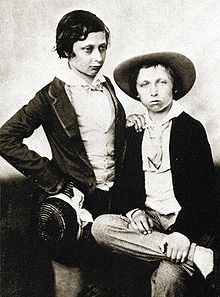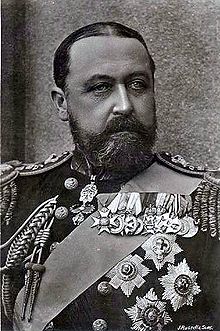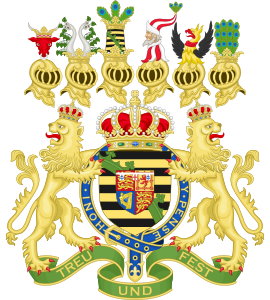Alfred (Saxe-Coburg and Gotha)
Alfred von Sachsen-Coburg and Gotha - completely HRH Prince Alfred Ernest Albert, Duke of Edinburgh , Earl of Ulster , Earl of Kent - (* August 6, 1844 at Windsor Castle , Berkshire ; † July 30, 1900 in Rosenau Castle , near Coburg ) was the second-born son of the British Queen Victoria and her husband Albert of Saxe-Coburg and Gotha .
After his career in the Royal Navy , he was reigning Duke of the German Duchy of Saxony-Coburg and Gotha from 1893 .
Life
Childhood and youth
His Royal Highness Prince Alfred was the fourth child and second-born son of the British Queen Victoria and her husband Albert of Saxe-Coburg and Gotha . Born on August 6, 1844 at Windsor Castle, he was the only child of the royal couple who was not born in Buckingham Palace . On September 6, 1844, the Prince was by the Archbishop of Canterbury , William Howley in the name of Alfred Ernest Albert baptized.
“Affie” as he was called in family circles, developed into a strong, spirited boy. Like all siblings, he received a careful, comprehensive upbringing and training. In contrast to his older brother, the heir to the throne Albert Eduard ("Bertie"), to whom he was very attached throughout his life, Alfred was considered hardworking and willing to learn. He showed interest in the latest technical achievements, but spoke the worst German of all the descendants of the royal couple .

In line with his personal inclinations, Alfred joined the Royal Navy in 1856 . After two years of training, he was appointed midshipman in 1858 and assigned to the frigate HMS Euryalus , with which he toured the British Cape Colony , the Orange Free State and Natal in 1860 . On a sea voyage to the West Indies and North America , he received news of the death of his father in December 1861, as his favorite son he was considered during Albert's lifetime.
After the abdication of the Greek King Otto , Alfred was elected as his successor by the Greek National Assembly in 1862, but had to reject the crown as prince of a great power for political reasons. In his place, the brother of his sister-in-law, as George I, became the new King of the Hellenes in 1863 . Prince Alfred continued his career in the Royal Navy and was made lieutenant captain in 1863 . From 1863 to 1865 he studied at the University of Edinburgh and the University of Bonn . In 1865 Alfred, who had been chosen as heir to the throne for his paternal uncle, Duke Ernst II of Saxe-Coburg and Gotha , visited Coburg in 1852 and acquired the Wangenheim Palace as his future residence.
On May 24, 1866, Alfred was appointed Duke of Edinburgh by his mother and received an annual allowance of £ 15,000 from Parliament . He also received a seat in the House of Lords .
In 1867 Alfred was made captain and was given command of the frigate HMS Galatea , with which he set off from Plymouth on January 24, 1867 on a world tour. He finally reached Australia via Gibraltar and Cape Town on October 31 , where he was enthusiastically received - as the first member of the British royal family to visit Australia. During his five-month stay, he was assassinated during a public picnic on March 12, 1868 in Clontarf . The Irishman Henry James O'Farrell shot him with a gun in the back. Alfred was not seriously injured, a month later he was able to resume his command on the HMS Galatea and continue the voyage. After a seventeen month absence, he reached Great Britain again on June 26, 1868. In 1868/69 he visited British India , Ceylon , Hong Kong , the Japanese Empire , Hawaii and New Zealand .
Prince Alfred was an avid seaman who was completely absorbed in his profession as a naval officer. He always devoted the greatest attention to his official duties and was considered efficient, his sense of duty and extraordinary sea tactical skills were widely recognized. From 1876 he was stationed in Malta and commanded the occupation of Cyprus in 1878 . In 1883 he commanded the Channel Fleet, from 1886 to 1889 Alfred took over command of the prestigious Mediterranean fleet in Malta. Alfred was 1878 Rear Admiral , Vice Admiral in 1882, 1887 Admiral and on June 3, 1893 finally Admiral of the Fleet , the highest rank in the Royal Navy.
marriage and family

On January 23, 1874, Alfred married the Russian Grand Duchess Maria Alexandrovna (1853–1920). From the beginning, this connection was not a lucky one and it would take six years before it even came about. Maria was the only surviving daughter of the Russian Tsar Alexander II and the Tsarina Marie . Neither side was enthusiastic about this connection. The tsarist couple found it difficult to give away their only daughter, and the Queen - especially since the Crimean War - had a deep dislike for the Romanovs. It took some time and several attempts to finally bring about the second marriage in history between the descendants of a Russian and a British monarch. This was done - in spite of Victoria's declared indignation - in the Winter Palace in Saint Petersburg . It was the only wedding of Queen Victoria's children that did not take place in the UK and the only one that Victoria, who strictly refused to leave the UK, did not attend.
The marriage had five children:
- Alfred (born October 15, 1874 - † February 6, 1899), Hereditary Prince of Saxe-Coburg and Gotha
- Marie (October 29, 1875 - July 18, 1938) ⚭ 1893 Ferdinand I , King of Romania
- Victoria Melita (born November 25, 1876 - March 2, 1936)
- ⚭ 1894–1900 Ernst Ludwig von Hessen-Darmstadt
- ⚭ 1905 Kyrill Vladimirovich Romanov
- Alexandra (born September 1, 1878; † April 16, 1942) ⚭ 1896 Ernst II. Zu Hohenlohe-Langenburg
- Beatrice (April 20, 1884 - July 13, 1966) ⚭ 1909 Alfonso d'Orléans-Bourbon
Governing Duke of Saxe-Coburg and Gotha
When his paternal uncle, Duke Ernst II, died in August 1893 with no legitimate heirs, Saxe-Coburg and Gotha fell to Alfred, as his older brother Albert Edward, the Prince of Wales and later British King Edward VII, had renounced the succession there . Alfred retired from active naval service and resigned from the British House of Lords and Privy Council . He kept his other British titles and honorary posts. He returned his annual allowance of £ 15,000 but kept the £ 10,000 extra that had been granted to him on the occasion of his wedding to maintain his Clarence House residence in London.
Taking office in Coburg was not easy for him. He was now a British prince on a German princely throne at a time when relations between the two countries were strained. Alfred shared his older brother Albert Edward's dislike of their common nephew, the German Kaiser Wilhelm II. As head of state of a small federal state in the German Empire , the duke only had domestic political power. He mourned his active time in the Royal Navy , which had been his home for the past 35 years. Even condemned to be a passive spectator, he followed all naval affairs very closely. Above all, he observed the German naval armament with great concern.
The German public was also unhappy with the British succession to the throne in Coburg and Gotha. Alfred's practice of placing his British titles ahead of German titles and the use of the term " Royal Highness ", which he was entitled to as a British prince but not as the ruling Duke of Coburg and Gotha and which therefore even employed the Federal Council , were resented. Alfred - just like his sister Victoria in Berlin - was viewed as a "foreigner" with suspicion, almost hostility. Some newspapers viewed his accession to government as an affront to German national sentiment. Over time, the attacks calmed down and Alfred's popularity in the duchies grew. By the end of his reign he had won the respect and approval of the population, although he spoke only broken German. With regard to state affairs in the duchies, Duke Alfred held back and largely gave the State Ministry a free hand. He preferred to hunt and travel. During a stay in Alexandria in 1898, he was bitten by a mosquito and contracted a protracted infection in his eye from which he did not fully recover. Alfred's last year of life was overshadowed by the death of his only son and heir to the throne, Alfred , who attempted suicide in 1899 during the celebrations for the silver wedding anniversary of the duke and couple and died two weeks later. Alfred blamed his wife and officially separated from her. He started drinking.
Death and succession
Duke Alfred died in July 1900, shortly before his 56th birthday, of throat cancer at his summer residence at Schloss Rosenau and was buried next to his son in the Ducal Mausoleum in Coburg .
His widow had a memorial church built in Luisenthal and a fountain in the Coburg park in his memory . She bequeathed the important and exquisite collection of antique and Venetian glass that she had gathered over the decades to the Coburg population. Today it is part of the art collections at Veste Coburg . He was succeeded as Duke of Saxe-Coburg and Gotha by his nephew Duke Carl Eduard , also a British prince and only son of the late youngest brother Leopold, 1st Duke of Albany , after the next contender, Arthur, 1st Duke of Connaught and Strathearn , had renounced the successor because of his British army career.
The title of Duke of Edinburgh expired with Alfred's death and was only given again in 1947 to Philip Mountbatten , the consort of the future Queen Elizabeth II of Great Britain and Northern Ireland.
Title and coat of arms
- August 6, 1844 to May 24, 1866: His Royal Highness The Prince Alfred
- May 24, 1866 to August 23, 1893: His Royal Highness The Prince Alfred, Duke of Edinburgh, Earl of Ulster, Earl of Kent
- 23 August 1893 to 30 July 1900: His Royal Highness The Prince Alfred, Duke of Saxe-Coburg and Gotha, Duke of Edinburgh, Earl of Ulster, Earl of Kent (German: His Royal Highness Duke of Saxe-Coburg and Gotha, Duke of Saxony, Prince of Great Britain and Ireland, Duke of Edinburgh, Count of Ulster and Kent )
literature
- Karl Heinz Wocker: Queen Victoria - The story of an age. Wilhelm Heyne Verlag, Munich 1991, ISBN 3-453-55072-2 .
- David Duff: Victoria and Albert - A royal love. Wilhelm Heyne Verlag, Munich 1990, ISBN 3-453-04262-X .
Web links
Individual evidence
- ↑ Hans-Joachim Netzer: Albert von Sachsen-Coburg and Gotha, CH Beck Verlag 1995, p. 309
| predecessor | Office | successor |
|---|---|---|
| Ernst II |
Duke of Saxe-Coburg and Gotha 1893–1900 |
Carl Eduard |
| personal data | |
|---|---|
| SURNAME | Alfred |
| ALTERNATIVE NAMES | Alfred of Edinburgh; Alfred of Saxe-Coburg and Gotha |
| BRIEF DESCRIPTION | Prince of Great Britain and Ireland, Duke of Edinburgh, Duke of Saxe-Coburg-Gotha |
| DATE OF BIRTH | August 6, 1844 |
| PLACE OF BIRTH | Windsor Castle , Berkshire , England |
| DATE OF DEATH | July 30, 1900 |
| Place of death | Rosenau Castle near Coburg |





